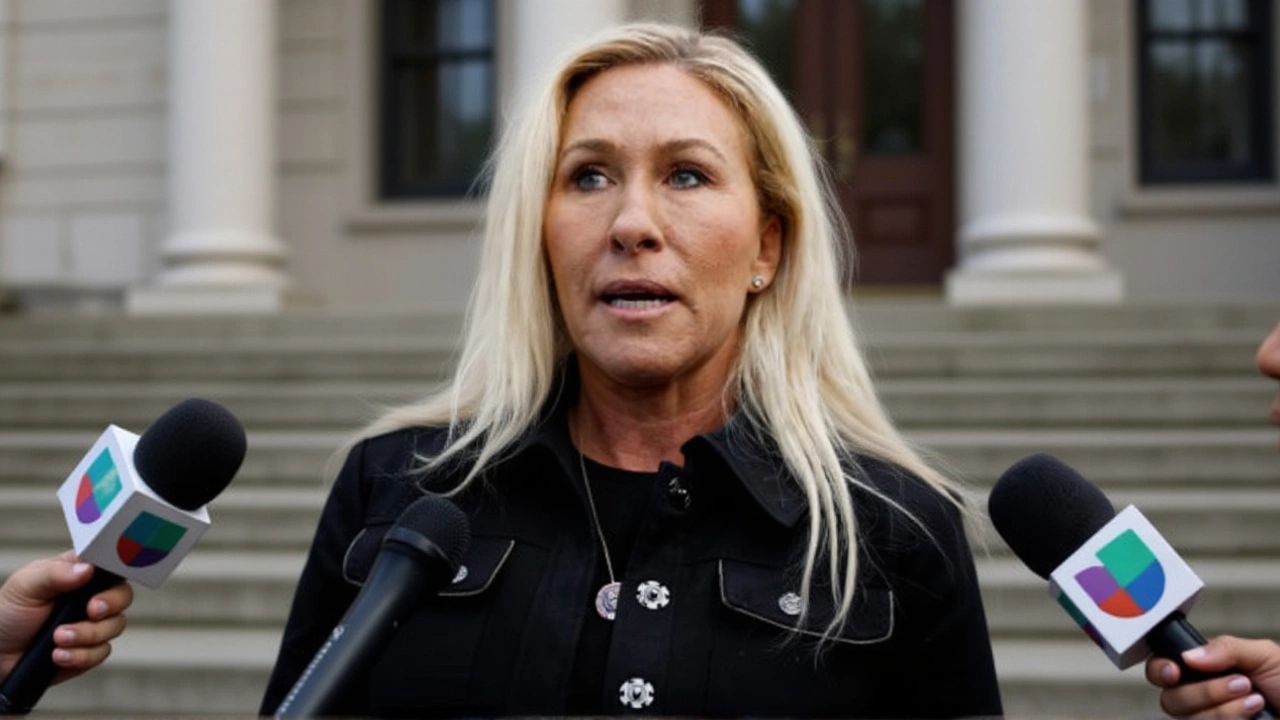Marjorie Taylor Greene resigns from Congress after Trump withdraws endorsement
 Nov, 23 2025
Nov, 23 2025
When Marjorie Taylor Greene stepped away from Congress on November 21, 2025, it wasn’t just another resignation—it was the collapse of a political alliance that once seemed unbreakable. The Marjorie Taylor Greene who stormed into the U.S. House of Representatives in January 2021 as a firebrand populist now walks away after a very public falling out with the man who helped launch her career: Donald J. Trump. Her last day? January 5, 2026. The trigger? A tweet. A revoked endorsement. And a super PAC that moved like clockwork.
From Trump’s Favorite Firebrand to His Latest Target
It started on November 14, 2025, when Donald J. Trump posted a blistering message on Truth Social, calling Greene a "wacky ranting lunatic." No warning. No private call. Just a public evisceration that sent shockwaves through the MAGA ecosystem. Within hours, MAGA Inc., the pro-Trump super PAC registered in Washington, D.C., began quietly lining up a primary challenger in Georgia’s 14th district. By November 17, Trump had reversed his position on the Epstein files, urging Republicans to demand DOJ transparency—a move many saw as a signal to purge loyalists who’d outlived their usefulness.
Greene didn’t wait for the primary to come to her. In a raw, emotional video released Friday night, she announced her resignation, tears visible but voice steady. "I have too much self-respect and dignity," she said. "I love my family way too much. And I don’t want my sweet district to endure a hurtful and hateful primary against me by the President we all fought for."
Her words carried weight. She’d been one of Trump’s most loyal congressional allies—voting with him 97% of the time since 2021, amplifying his claims on social media, and even defending him during his impeachments. But loyalty, in this new political calculus, had a shelf life.
The Fallout: A District on Edge, a Party in Chaos
Georgia’s 14th district, which Greene won in 2020 with 74.7% of the vote, is a Republican stronghold carved from rural and exurban counties stretching from Rome to the Alabama border. But now, it’s a political bomb waiting to detonate. Federal law requires a special election within 40 days of her January 5, 2026 departure. The Georgia Republican Party, headquartered in Atlanta, will oversee the process. Already, at least three candidates have signaled interest—including a former state legislator backed by Trump-aligned donors and a retired Marine colonel with deep ties to the MAGA movement.
Greene didn’t just resign. She warned. "Republicans will likely lose the midterms," she said in her video, referring to the 2026 elections. She blamed GOP leadership for ignoring expiring Affordable Care Act tax credits and failing to deliver on conservative promises. Her resignation, she argued, was a protest—not just against Trump, but against the entire system.

A Tenure Defined by Controversy
Greene’s time in Congress was never quiet. On February 4, 2021, the U.S. House of Representatives stripped her of all committee assignments after she posted videos promoting conspiracy theories—including claims that the 2020 election was stolen and that prominent Democrats like Nancy Pelosi were involved in child trafficking rings. She later called the vote "a witch hunt."
In 2024, she escalated her rebellion within her own party, attempting to unseat Speaker Mike Johnson of Louisiana’s 4th district. The move came just months after the chaotic ouster of former Speaker Kevin McCarthy in October 2023. Greene’s effort failed—but it cemented her reputation as a House wild card who played by no rules but her own.
Yet for all her extremism, she had a raw connection with her base. Her rallies drew thousands. Her livestreams got millions of views. She didn’t just represent her district—she embodied its anger.
Trump’s Calculated Move
Trump didn’t just withdraw his endorsement—he orchestrated its replacement. According to Rachel Scott, senior political correspondent for ABC, Trump told her on November 21: "I think it’s great news for the country. It’s great." Meanwhile, Nicole Killian, CBS’s congressional correspondent, reported Trump’s follow-up social media post: "Green is resigning because of quote plummeting poll numbers."
But the numbers tell a more complex story. While Greene’s approval among Georgia Republicans dipped slightly after the Epstein reversal, her base remained loyal. The real threat wasn’t polling—it was Trump’s ability to mobilize money and volunteers against her. MAGA Inc. didn’t need to win a primary. They just needed to make it ugly enough to drain her energy, split the vote, and hand the seat to a more reliable ally.

What Comes Next? The Real Power Play
Greene’s departure leaves more than a vacancy. It leaves a question: Who controls the GOP now? Is it the party apparatus? The donors? Or the man in the White House?
Her resignation statement hinted at a deeper truth: "When the common American people finally realize... they possess the real power over Washington, then I’ll be here by their side to rebuild it." Whether that’s a genuine call to grassroots action or a farewell pitch for a future media empire remains to be seen. But one thing is clear—she’s not going quietly.
And Trump? He’s already moving on. The next chapter of MAGA politics won’t be about loyalty. It’ll be about control.
Frequently Asked Questions
Why did Marjorie Taylor Greene resign instead of facing a primary?
Greene chose to resign to avoid a divisive primary that would drain resources and potentially split the conservative vote in Georgia’s 14th district. She feared a Trump-backed challenger would turn the race into a national spectacle, damaging GOP chances in the 2026 midterms. By stepping aside, she preserved her reputation and spared her constituents a bitter internal fight.
How will the special election in Georgia’s 14th district be handled?
The Georgia Republican Party will oversee the special election, which must be held within 40 days of Greene’s departure on January 5, 2026. The primary will likely occur in late January or early February, with the general election in March. Early frontrunners include candidates backed by MAGA Inc. and Trump-aligned donors.
What role did MAGA Inc. play in Greene’s resignation?
MAGA Inc., a pro-Trump super PAC, quietly began preparing a primary challenge after Trump’s November 14 endorsement withdrawal. Though it didn’t officially announce a candidate, it mobilized donors, media allies, and grassroots volunteers to pressure Greene. Her resignation was widely seen as preemptive—a way to avoid being outspent and outmaneuvered.
How does this affect the 2026 midterm elections?
Greene’s exit creates uncertainty in a reliably red district, but the bigger impact is symbolic. Her resignation signals Trump’s tightening grip on the GOP’s direction. If he can force out even his most loyal allies, it warns other Republicans: loyalty to him matters more than loyalty to the party. This could suppress turnout among moderates and energize the base—but also risk alienating suburban voters critical to winning the House.
What’s next for Marjorie Taylor Greene?
Greene hinted at continuing her political activism outside Congress, possibly through media or a new grassroots organization. With millions of followers and a reputation as a truth-teller to her base, she’s uniquely positioned to become a dominant voice in conservative media. She may launch a podcast, book, or even a PAC focused on "rebuilding America"—a phrase she used in her resignation speech.
Is this the end of Trump’s influence in Congress?
Far from it. Trump’s orchestration of Greene’s exit proves his influence remains absolute. He doesn’t need to hold office to control it. By removing a liability and replacing her with a more dependable candidate, he’s sending a message: loyalty is conditional, and dissent—even from the most loyal—isn’t tolerated. This is how he maintains power.